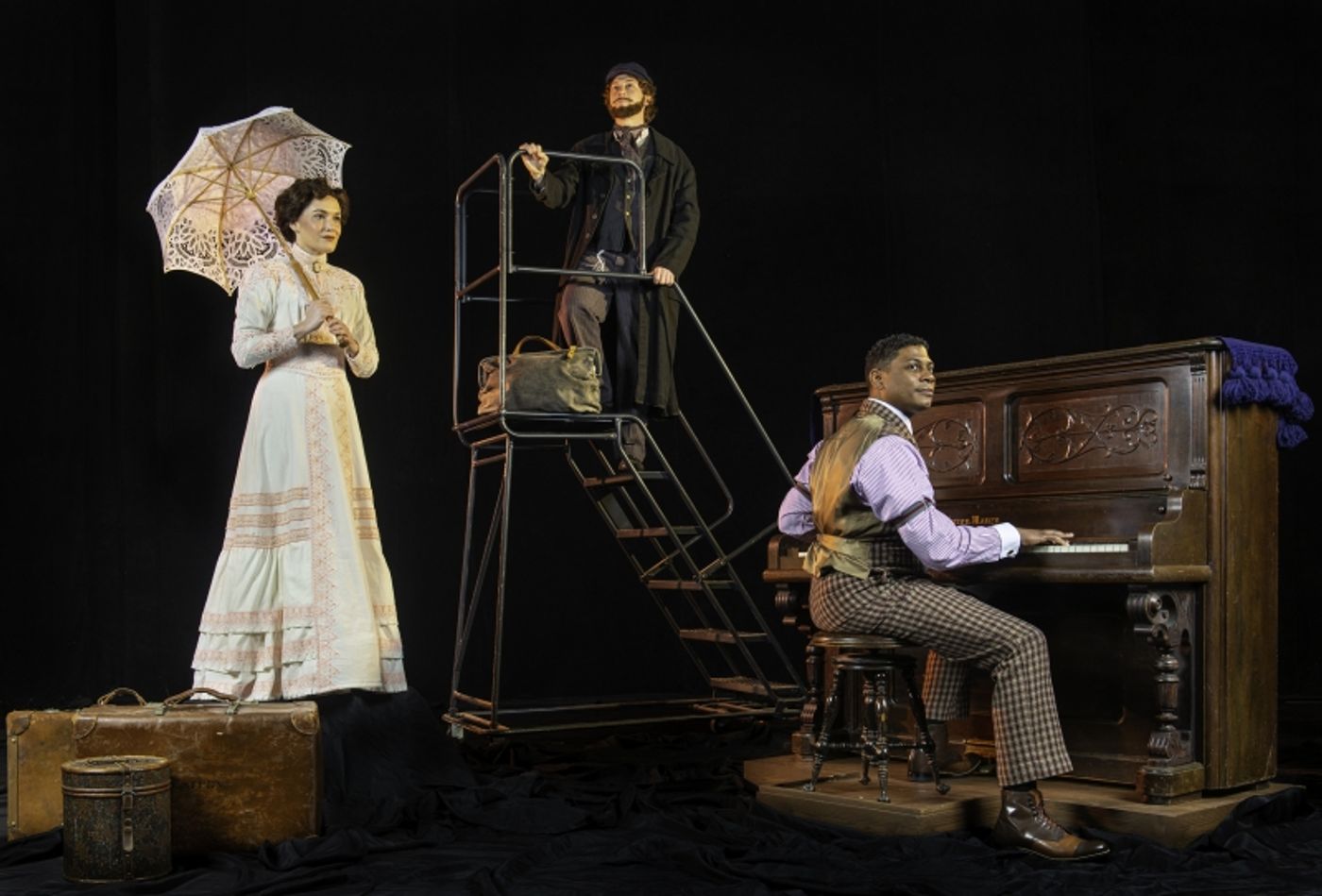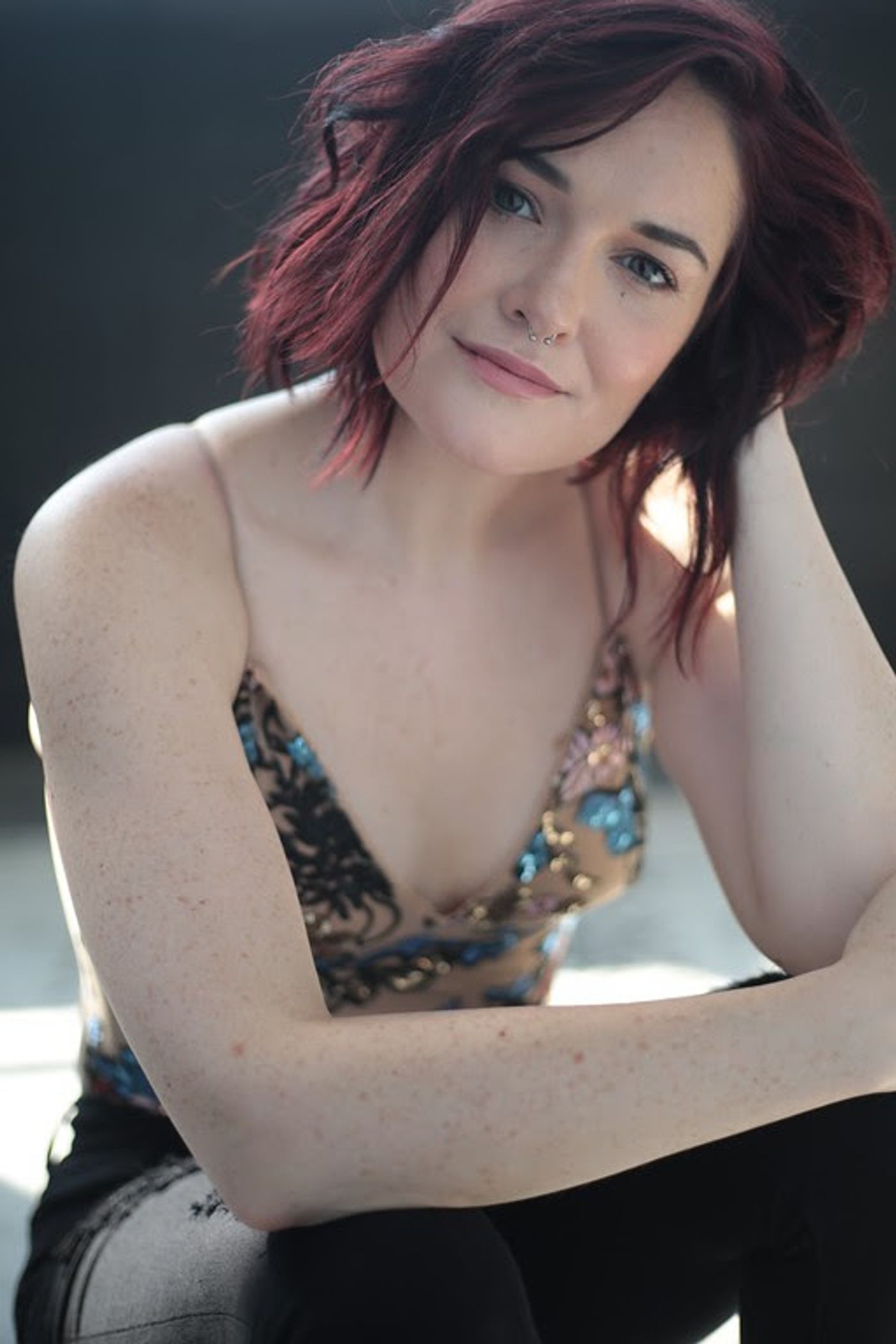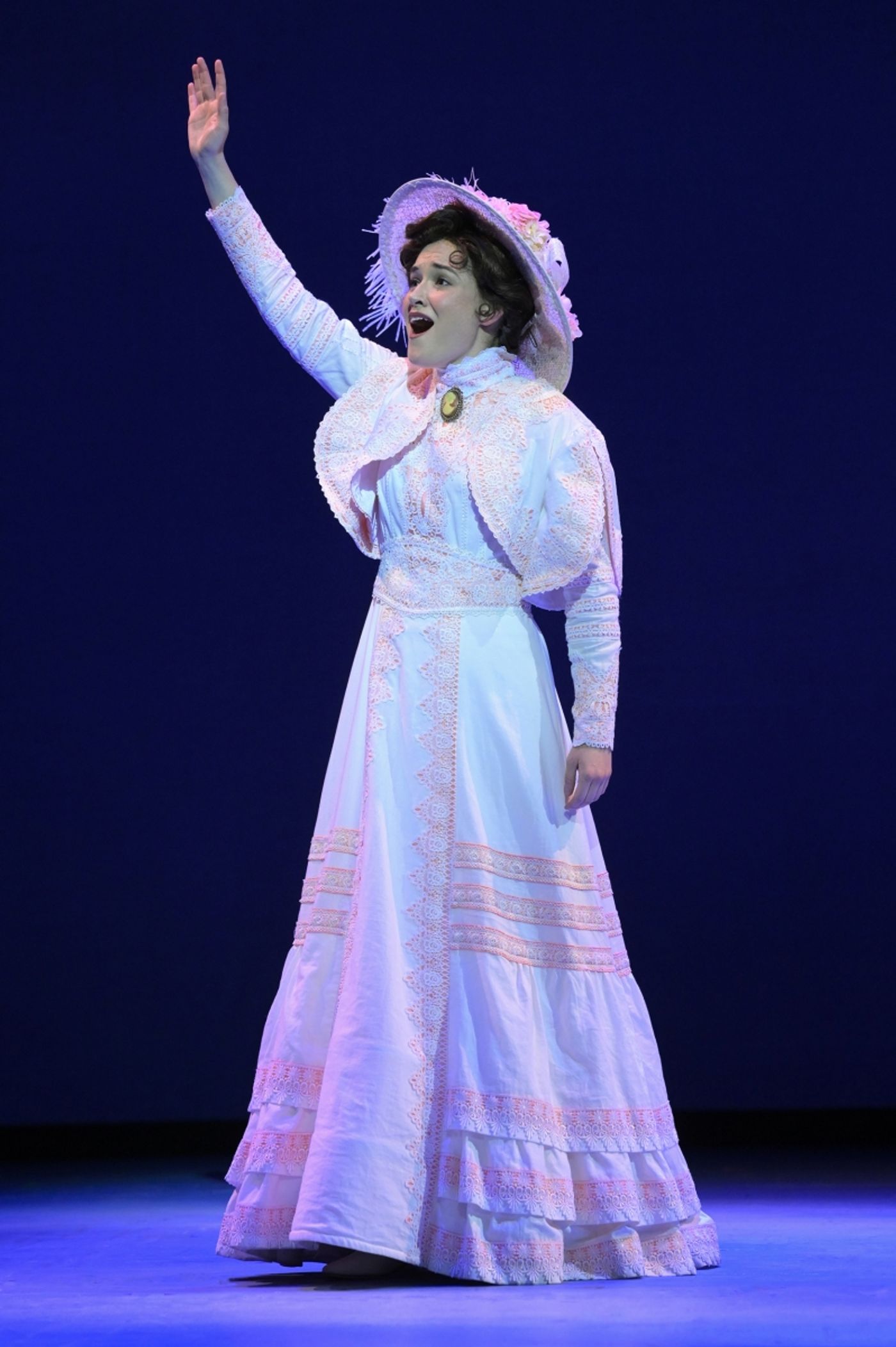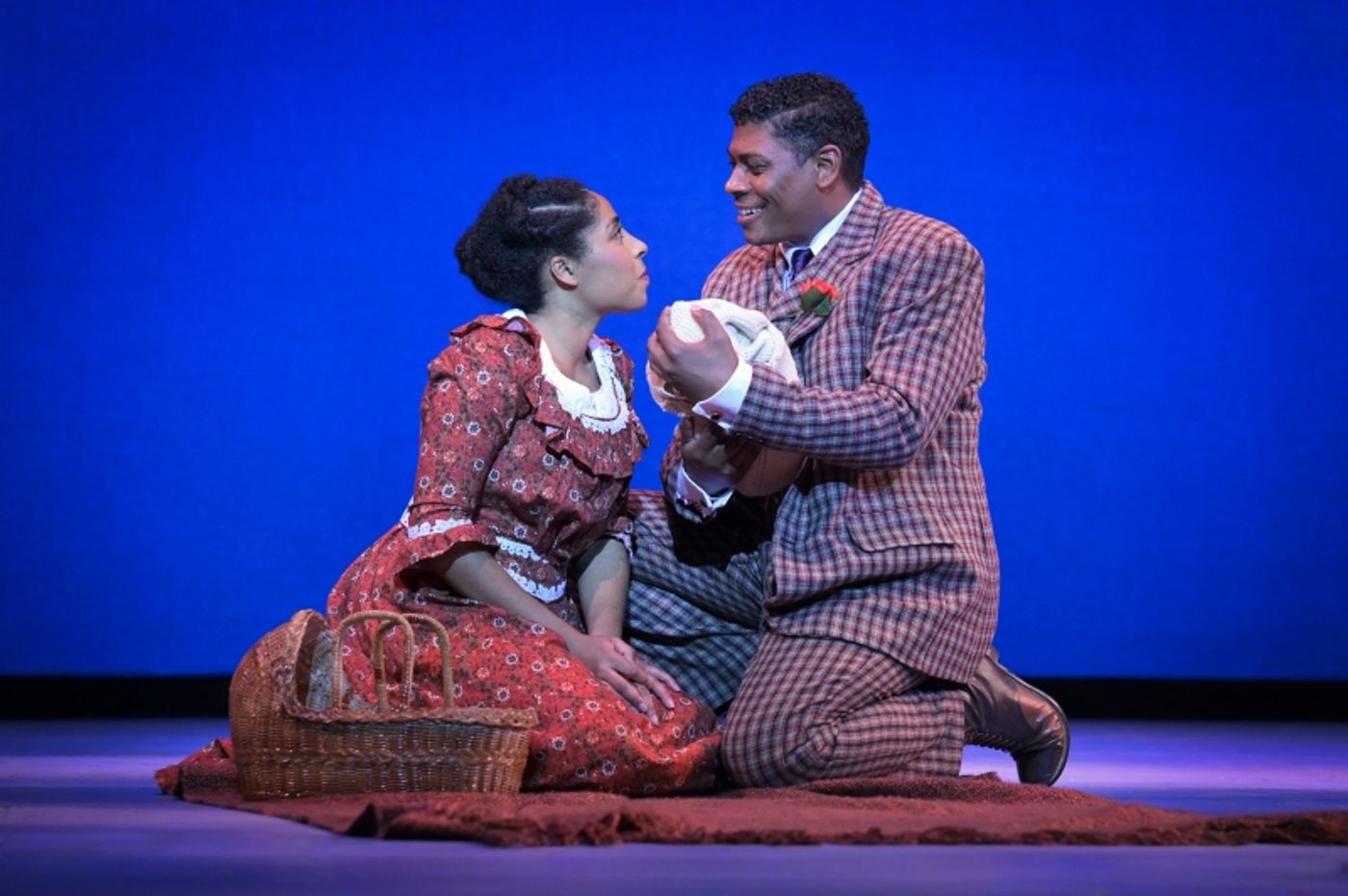Interview: Christine Dwyer of RAGTIME at TheatreWorks Silicon Valley Charts Her Own Course to Find the Character of 'Mother'
Dwyer stars in a new production of that most American of musicals, running June 1 to 26 in Mountain View

in Ragtime at TheatreWorks Silicon Valley
(photo by David Allen)
By her own admission, Christine Dwyer is a little surprised to find herself playing the role of Mother in TheatreWorks Silicon Valley's new production of the classic American musical Ragtime. Best known for playing high-belting, gutsy women like Elphaba in Wicked on Broadway, or Jenna in Waitress and Maureen in Rent on national tours, Mother would seem to be a whole other kettle of fish. Dwyer now finds herself portraying a cossetted, well-to-do white woman in the early 20th century who has her eyes opened when she discovers a Black newborn partly buried in her garden, and then takes both mother and child into her New Rochelle home. Mother also calls for more of a lyric soprano sound than Dwyer is typically known for, yet she is more than determined to make this role her own.
I spoke with Dwyer last week while she was in the midst of tech rehearsals for the multi-layered show. We talked about her conception of her character's journey, what it's been like working at TheatreWorks for the first time and telling this story of racial violence, immigrants' rights, and the changing status of women that seems every bit as relevant now as when it was created in the best-selling 1975 E.L. Doctorow novel and then reimagined for the 1997 musical by book writer Terrence McNally, lyricist Lynn Ahrens and composer Stephen Flaherty. We also touched on what's known as the "Green Girl Sisterhood" of all the women who've risen to the challenges of playing Elphaba over the years. Chatting with Dwyer, I was struck by how open and unguarded she is, and how much she is enjoying digging into the complexities of Ragtime. The following conversation has been edited for length and clarity.
This particular production of Ragtime was originally scheduled to open back in 2020. Were you cast in the show two years ago?
No, I was not. A person I know, Marissa McGowan was cast [as Mother] a couple of years ago, and because so much time has passed, she was unavailable. I auditioned pretty recently actually, and found out that I was coming here about two and a half weeks before the start of rehearsals. So I'm a new cast member, but thrilled to be here.
How familiar were you with the show before getting cast as Mother?
I actually wasn't too familiar with it. I mean, it's one of those shows that everybody who has ever studied musical theater knows the songs from, like "Til We Reach That Day," "Make Them Hear You," "Back to Before," and "Your Daddy's Son." But I had never seen the show and I didn't actually know too much about it before the first day of rehearsals. It's very quickly become one of my favorites, for sure.

(photo provided by Boneau/Bryan-Brown)
Mother is a very different character, both in terms of temperament and vocal style from the two roles you're maybe best known for - Elphaba in Wicked and Jenna in Waitress. So - how have you gone about finding the character of Mother?
That's actually something I was pretty nervous about it, coming in, because this isn't typically the type of thing that people ask me to do. It's not the type of music people ask me to sing, so I was honestly a little bit surprised that I got cast. I quickly started working with my voice teacher on how to find that true musical theater soprano voice that I'm just not usually asked to do. The best part about working here is that it never felt like anybody wanted me to do an impression of anybody else. They hired me for a reason, and they made me feel that way. I've felt very supported in terms of finding my own version of this character, which I think is going to be a little different than other people who have played it, because I have that background of playing these strong, vocal women. I think that Mother is one - it's just a different time, we're talking about different things, and she has different pressures than someone like Elphaba. I think she's actually more like Jenna in a lot of ways, not vocally, but in finding her strength to get away from what society and the men in her life want her to be, and actually go out on her own and make her own choices.
It's such a great journey that she goes on, one that is so important and one that I connect to very easily as a white woman living in the world that we live in right now. I feel very supported in the way that I've been able to find my version of this character, and I also think that going forward this character is going to be played in a different way, with the information that we all have now, with the world that we're living in and the last two years where we've had time to reflect on what this country is, and what our part in creating that change is.
I start this character a little bit more ready for change and then she actually makes the change, as opposed to being ignorant of it in the beginning and then discovering it. I think that she already knows what is right and she's so moral that all she needs is for her husband to go away so she's in charge and does make her own decisions. I think she starts the show already knowing that things need to change, but she just doesn't have the space to do it until he leaves. And then the circumstances of Sarah and Coalhouse coming into her life facilitate that in a faster way than maybe it would have, had they not come into her life.

on an expedition in Ragtime at TheatreWorks Silicon Valley
(photo by Kevin Berne)
What has it been like working with your director, Robert Kelley, who's something of a Bay Area theater icon?
Oh, he's great. What has been so lovely about this process is we've had to deal with a lot of tough conversations just based on the show itself. What I love about him is that his main goal through this process is to tell this story in the right way, and make everyone who has to tell it feel comfortable and like they can speak up for themselves and feel supported by him. We have somebody on staff to talk to us about our emotional journeys, which I think is great and not something I've experienced in other shows I've done. You know, [usually] if you're affected by a show in an emotional way, you figure it out on your own, and that's that. So this production has been leaps and bounds better and different for the actors, just feeling like we can speak up, we have a voice and we are allowed to have an emotional response without feeling bad about that or having to feel alone in experiencing that. Kelley made that very clear from the moment we all got here, and I just thought that was really impressive and so important, especially for this piece.
I can't imagine what it's like being in the rehearsal room, working on this show that was written 25 years ago, but due to recent and ongoing events feels like it's about right now.
Yeah, it definitely feels even more relevant now, even though it's actually not more relevant. What makes it so thought-provoking is that it was written at a time where we weren't having these conversations, about a time where we weren't having these conversations, and now we are doing it while we are actually able to open up about the things that people experience, and the differences between races and between gender identities, and between ages and all of that. That's wrapped up into this show and I think it really touches on every single part of what makes being a human so complicated.
Everybody does have different experiences, and people of different ages are processing information in a different way because of the society that they grew up in and whatever. What makes it so relevant and amazing is that now we're doing it at a time where we can do a scene and then we can sit down and talk about why those things are still relevant, how they're affecting us today, and what can we do to change, instead of just singing a beautiful song like "Til We Reach That Day" [and not talking about it]. It brings on a whole new meaning because we haven't gotten there yet, but it does feel like we're at the precipice of being able to really create that change because we're talking about it in a real way now. As opposed to, "Oh, yes, racism was a thing, but now it's not. We've fixed it." No, we haven't. And now we're actually saying that out loud.

dream of a better life for their son in Ragtime at TheatreWorks Silicon Valley
(photo by Kevin Berne)
You've played Elphaba both on Broadway and on tour. As you well know, Wicked has one of the all-time great Act I closers in "Defying Gravity." What's it like to actually belt out that song while simultaneously ascending to the Western skies? How is that not just totally terrifying?
You know, when the stage lights are on and you can't really see the audience, like during the run of the show, it's much less scary than when they put you in the lift with all of the house lights up and you actually see how high you're going. [laughs] I remember the first time actually getting into that lift, they wanted me to see what it was and so all the house lights were up, and the deck crew was onstage to make sure that everything was going smoothly. And to really watch myself go up and see how small everybody was getting below me was much scarier than what it actually feels like in the show.
In the show, you're so emotionally invested at that point, and honestly exhausted because the first act is very long, like an hour and 40 minutes or something, and you're onstage for almost the entire thing, belting and running around and doing quick changes and all sorts of things. So, "Defying Gravity" when you're doing it in the show, to me anyway, didn't feel scary. It felt like a triumph, like "OK, I got through the first act!" I think the adrenaline rush doesn't even allow you to process the fact that you're rising. You're just like getting through that song and emotionally belting it out, and it honestly feels very cool. It's a very rockstar, pat yourself on the back, you did it, moment. That's the way that I always looked at it. But getting into the lift with the house lights up was pretty scary. [laughs]
"Defying Gravity" also culminates in what is maybe my all-time favorite lighting cue, that brief burst of light on the broom Elphaba is holding triumphantly above her head, just before a total blackout. I'm amazed that in performing that song you have to sing your face off, but there's also all these technical marks you have to hit. Otherwise, the scene doesn't work.
Oh, yeah. And you also have your bag with the book, the "Grimmerie," which is pretty heavy on your back. There's choreography to it - you run back there, you have to throw the cape over the lift, you have to step onto it, you push your back into it so that it closes, and then you're starting up. It's so timed out that you don't have the time to take a deep breath.
The other thing that people don't understand, too, is when you audition for it, you can plant your feet on the ground, shoulder width apart, and belt that song out and ground yourself. In the actual show, you are standing on a platform that is just large enough for your feet to be like completely pressed together. There's not space for you to spread out, the apparatus doesn't allow you to ground yourself, which I'm sure was intentional because it should feel like you're flying. But it also is a completely different beast to sing that song and do everything that you're supposed to do while making sure that your foot doesn't slip off of this very small platform, and pushing your back into this skirt that closes in front of you. All of that stuff, it's definitely built into the track, but you do kind of like have to drop the "Elphaba of it all," just to make sure that you are safe and you did all the things you were supposed to do to make the moment work. [laughs]
So it's a strange thing to have done, and that's why there's what we call the "Green Girl Sisterhood." Pretty much when you find out somebody has done that role, you instantly become kind of best friends because you've been through that crazy time and that crazy moment in the same way, and nobody knows what that feels like except for other Elphabas. It's a very fun and supportive group to be a part of, and I really do feel like every single Elphaba that I have met has supported me in some way, even if we never worked together, just because we've been through that thing.
You also starred as Sylvia Lewellyn Davies in the national tour of Finding Neverland. Your character's death scene near the end is one of the most magical stage effects I've ever seen as she seemed to dematerialize right in front of our eyes in a haze of glitter. Are you allowed to divulge how they managed to pull that off, or are you like forever sworn to secrecy?
Oh gosh, while we were doing it I wasn't supposed to say anything, but that was a while ago so I think now I probably can. It's one of the most magical things that I've seen in the theater, too. It was all these fans that come up from the stage deck, and each fan has a different strength so that when Peter Pan throws the glitter, it stays where it is and then swirls up in the way that it does. [Director] Diane Paulus is so wonderful about creating these pictures and coming up with visual, magical moments. She knew exactly what she wanted it to look like, and then she got the right people to figure out how to make it work. And it was glorious to be in the audience and watch that happen.
In the moment, it looks really beautiful, but also there's just dust that happens throughout the show, there's a dog in that show so there's dog hair, there's all sorts of things that end up kind of blowing into your face in this really beautiful, magical moment for the audience. For the actor you're like "OK, I need to make sure that I don't inhale all of this glitter and dog hair and dust that has accumulated over the course of this show, so that I don't choke." [laughs] But it was really amazing to do every night. I knew how cool it looked because I'd seen the Broadway show, so it felt incredibly magical, while also again, just like Elphaba, thinking about all those other little technical things that nobody knows that you're thinking about in that moment.
Didn't you also work with Diane Paulus on Waitress?
Yes. I worked more closely with her in Finding Neverland because I opened that national tour, so we got a lot of rehearsal time. For Waitress, I took over as the second Jenna on the first national tour, from Desi Oakley, who I had actually worked with on Wicked before. So that was fun, to like take over for her. But Diane did come out and had rehearsal with me and got to see me do the show. We're great friends and she's a wonderful director. I just can't say enough about loving working with her.
---
Ragtime runs live June 1-26, 2022 at the Mountain View Center for the Performing Arts, 500 Castro St., Mountain View, CA. For tickets and more information, visit TheatreWorks.org or call (877)-662-8978.
Videos

